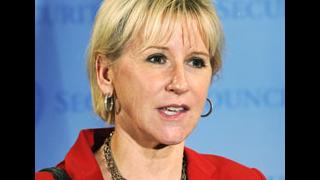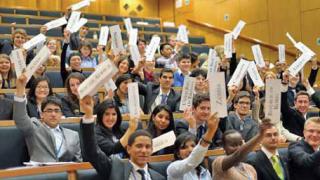
The adoption of UN Security Council Resolution 1973 (SCR 1973), which imposed, amongst other things, a "ban on all flights in the country's airspace - a no-fly zone - and tightened sanctions on the Gaddafi regime and its supporters," represents one of the most robust responses to aggression against civilians seen in recent years. In reference to SCR 1970, which paved the way for SCR 1973 and effectively consolidated international political sentiment against the Libyan ruler's targeting of civilians, UN Secretary-General Ban Ki-moon said: "it is a vital step - a clear expression of the will of a united community of nations."
Yet, in the face of multiple attacks on civilians, many have asked why, if that community of nations is so united in will, does it take so long to pass motions that facilitate their protection? This raises a further question: should violence against civilians always demand an intervention, even when the international body responsible for maintaining peace and security - the UN Security Council - is divided?
This is a divisive question and one that defies a simple answer. Dr. Luis Peral from the EU Institute for Security Studies would say that our answer should be an emphatic 'yes'.
"If the body whose primary responsibility it is to preserve international peace and security does not provide a timely - i.e. immediate - response to a 'gross and systematic violation of human rights' characterised by attacks on the civilian population which 'may amount to crimes against humanity', as the [resolution on Libya] acknowledges, other actors in the international community are entitled to take the lead under international law and implement the Principle of the Responsibility to Protect (R2P)..."
The UK Foreign Secretary, speaking on 8 March, stated then that a no-fly zone would require, "a clear legal basis, a demonstrable need and strong international support and broad support in the region and a readiness to participate in it." In very many ways this strikes at the heart of the intervention debate. While the legal basis and demonstrable need may support the moral imperative argument, there is also a need, in both practical and political terms, for regional and international support. (Click here for Sir Jeremy Greenstock's interview on the legitimacy of the Iraq intervention) This does not always run smoothly alongside the humanitarian requirement of protection - something that the R2P doctrine was created to address. After all, if we only intervene when it is politically manageable, what is the point and purpose of multilateral bodies aimed at maintaining peace and protecting human rights?
One counter to this is that interventions should not run the risk of destabilising a situation further, and that participants must be ready to go a step farther if, for example, a limited response is ineffective. In this vein, General Lord Dannatt, former UK Chief of the General Staff, has said: "If a clear request from a substantial part of the Libyan population was received by the Security Council, backed by the Gulf Co-operation Council, the Arab League, or perhaps the African Union, and the Security Council then passed an appropriate resolution, it might be legitimate to impose a no-fly zone. But if that did not produce the desired effect, in the way that the bombing campaign in Kosovo and Serbia in 1999 nearly failed to achieve its aim, is the international community willing to take the intervention to the next level?"
A no-fly zone is, of course, itself restricted in what it can do to protect civilians from aggression. The question is, how far can and should the international community go beyond this in order to fulfill its Responsibility to Protect?
No country exists in a vacuum and therefore cases like Libya cannot be approached in isolation. If the intervention - in this case the no-fly zone - did not have the backing of a majority of Arab countries or the African Union, and had been, for example, purely American-led, the regional fall-out would have affected relations between Western countries and the Middle East for years to come. Many commentators have also pointed to the issue of sovereignty, noting that only in extreme circumstances, under strict conditions and with wide support, could intervention ever take place, as Foreign Secretary Hague intimated in March. In addition to which, if a decision was made to enable an intervention without Security Council backing, it would not only set another precedent, but also compromise further the UN decision-making apparatus. Might these reasons alone dissuade the international community from intervening?
Well, proponents of limited intervention would argue that any state, once it has gone down the path of using violence against its own people, robs itself of its rights as a state in much the same way as a murderer is removed of his or her rights as a citizen. In addition, if - as was the case in Libya - it is highly improbable that people are in a position to call for international intervention with a concerted, united voice, how can one make a judgment on whether intervention has been asked for?
A concluding question might then well be, at what point on the decision-making spectrum does the moral imperative to intervene override the practicalities and politics of the given situation? After all, one has only to think of the reticence demonstrated by many within the international community in 1994 in not only referring to what was happening in Rwanda as 'genocide', but in supporting intervention that would have potentially halted slaughter. In such quickly evolving situations, timing is everything. As Rwandan President, Paul Kagame, wrote in The Guardian newspaper on 23 March 2011, "No country knows better than my own the costs of the international community failing to intervene to prevent a state killing its own people. In the course of 100 days in 1994, a million Rwandans were killed by government-backed genocidaires and the world did nothing to stop them."
James Kearney is UNA-UK's Peace and Security Programme Coordinator

















